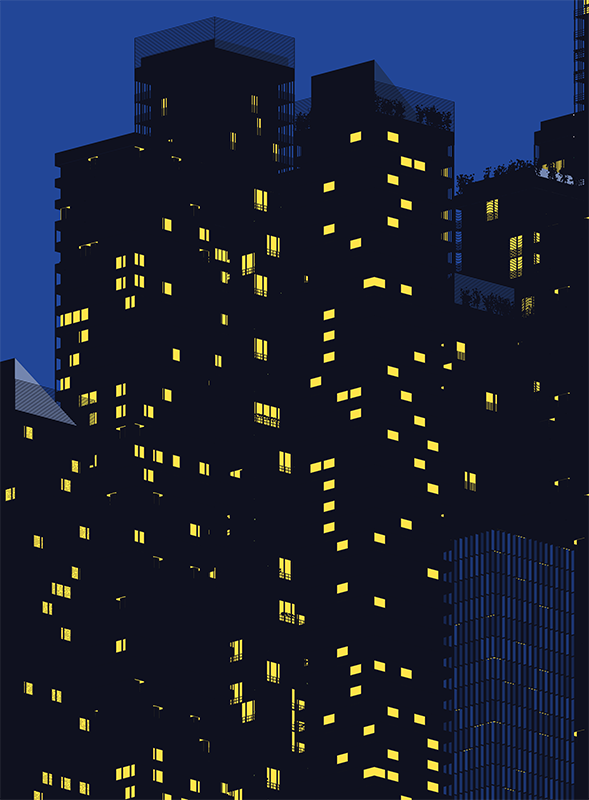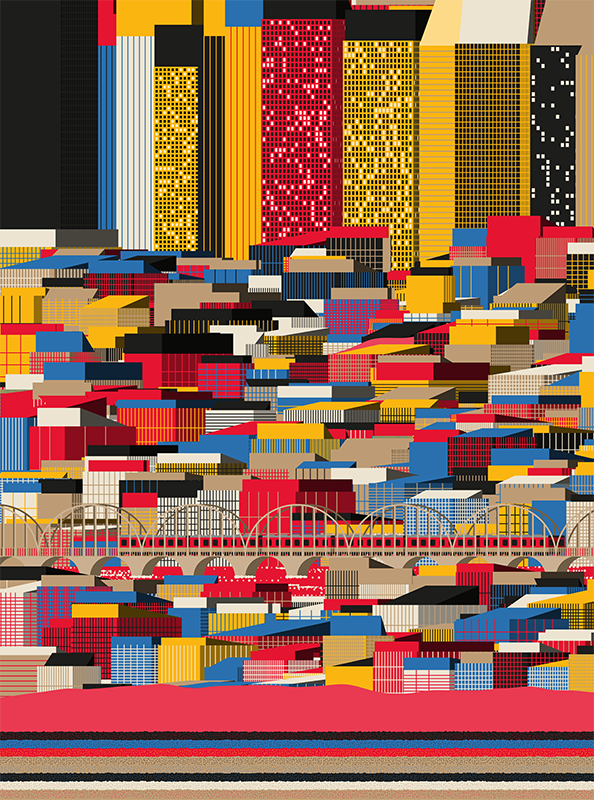As we delve deeper into the digital age, the intersection of art, technology, and AI has created a new universe of creativity. This realm, where human craftsmanship melds seamlessly with the intricacies of digital artistry, is where artists like Studio Yorktown thrive.
Every week, nft now’s Next Up unveils a new artist from our curated list of ascendant talents who have been making significant waves throughout Web3. This week, we’re excited to feature Studio Yorktown.
Studio Yorktown
Kwame Bruce Busia, better known as Studio Yorktown, is a visionary artist and creative entrepreneur who blends the worlds of design, architecture, and digital art with blockchain technology. Stepping into the arena of NFTs and crypto in 2016, Yorktown emerged as a pioneer, pushing the boundaries of artistic expression and redefining how art can be created, owned, and traded.
Notably, his first break came with the launch of his project, “Tenement,” on Async Art. This initial success, combined with his explorations on platforms like fxHash, has allowed him to delve deep into the intersection of art and technology. During that time, he discovered the project ‘Loom’ by Andreas Rau, which inspired him to dive into coding with p5.js and explore the Tezos blockchain. Leveraging their newfound coding skills, they created their first collection ‘Sabler’ on the fxHash platform. Since then, the artist has continued to explore and create with code, pushing the boundaries of generative art and NFTs, profoundly transforming his artistic practice and connecting with a global audience.
The artist’s process is anchored by a combination of sketching, systematic planning, and experimentation. His work is known for an array of architectural landscapes, using a vibrant palette and diverse geometric shapes to breathe life into cityscapes and abstract structures.


We had the opportunity to ask Studio Yorktown a few questions about NFTs and his artistic process.
nft now: How did you get started in NFTs?
Studio Yorktown: I began my journey in NFTs fueled by a passion for cryptocurrency that emerged in late 2016. The underlying technology fascinated me, and I was curious to explore its potential applications. At the same time, I had just established my company Studio Yorktown, where I was focused on creating resources and products for digital artists.
As I explored deeper into the world of crypto, I started hearing a lot about NFTs. The concept intrigued me, and I wanted to understand more about this emerging technology and its connection to the art world. With the desire to merge my products with NFTs, I set up an account on Rarible and applied to various platforms, though many of those early attempts were somewhat unsuccessful.
However, my first break came when I received an invitation to join Async Art. It was there that I created my first project called “Tenement”, which was received in a way that surpassed my expectations. This success fueled my curiosity to explore more innovative ways to leverage the platform and the transformative possibilites of NFT technology.
“It wouldn’t be an exaggeration to say NFTs have changed my life and given me a renewed sense of purpose. I have embraced opportunities, learned new skills, and grown as an artist, leveraging the power of NFTs to share my work with a global audience.”
Studio Yorktown
nft now: How would you describe your art?
Studio Yorktown: My art style is a combination of many influences and approaches, mainly stemming from my background in architecture and as a graphic designer. At times it is technical, other times it is naive, or somewhere in between. For my graphic design work, I often draw inspiration from mid-century modern and the Swiss International Style, which rely heavily on grid-based layouts.
“I think such influences have resulted in aesthetics and coding processes that are rooted in underlying grids and modularity.”
Studio yorktown
While I don’t consciously adhere to any one particular style, my artistic journey with generative art began with abstract and geometric compositions. I appreciate visual simplicity and the use of basic shapes, however I have been recently experimenting with more figurative pieces, trying to find the right balance between mathematical precision and a well-crafted yet human appearance. Rather than trying to replicate natural media and texture, I prefer to try to find the perfect “tension” between precise geometric forms and an artistic touch that conveys depth and emotion.
Craftsmanship is essential to me, and I strive to convey this value to collectors, despite working in the digital realm. Even though my medium is digital, I am dedicated to creating art that reflects a meticulous attention to detail and a sense of quality as a guiding principle.
Color also plays a vital role in my aesthetic expression. I prefer to make a bold impact with a carefully curated selection of a few colors at a time, rather than relying on lots of colors. Each color choice is intentional, as I’m trying to communicate emotions and the traces of experiences through deliberate color combinations.
nft now: What’s Your Process Like? And where do you usually find inspiration?
Studio Yorktown: Although each collection is unique, my process is often a combination of sketching, systematic planning, and experimentation with generative concepts. With each project, my overall vision is to create imagery that resonates or connects with viewers visually and emotionally through a sense of mood or memory.
“What if I could communicate a sense of nostalgia through code?”
Studio yorktown
Though I like to work with a clear concept in mind, I always create space for the original idea to evolve organically if and when necessary during the creative process. This way, one is free to make unexpected discoveries and opportunities for growth without compromising on the original vision.
I usually start a collection with a “what if” question or a feeling. What if a pattern or image like this could be made generatively? What if I could communicate a sense of nostalgia through code? I will ask myself these kinds of questions to see if that curiosity is worthy of further exploration. I find a lot of inspiration in contrast, the big city versus the quiet town, loud versus quiet, detailed versus plain etcetera. I find a lot of energy in exploring the tension between opposites, particularly when one thing becomes its opposite. How can that kind of balance be expressed visually and elegantly when dealing with the randomness of generative code? This is something that I am constantly exploring and trying to answer through my work.
Play is also an integral part of my process— I love experimenting with physical models like wooden blocks or toy bricks, as they help me conceive new ideas. I get to explore shape, space, tension, balance, unexpected shapes which either directly or indirectly end up in sketches, which later may inform my designs.
Finally, once I am clear on the idea and I have a general idea of how I would go about coding it, the part of the process I enjoy the most is the act of refinement. Whether it’s ironing out bugs, or finding a more elegant solution for a section of code, or finding a more efficient or effective solution for a problem, I love the act of incrementally improving results from the inside out. It feels like chipping away at a block of marble to reveal the form within, except with code. It feels similar to writing where you can explain something in a simpler way, or find the exact right word and improve the legibility. Though the viewer may not perceive or be aware of the refinement process, for me it is a way to express value, gratitude and respect to the viewer through the craftsmanship and quality of the intangible.


